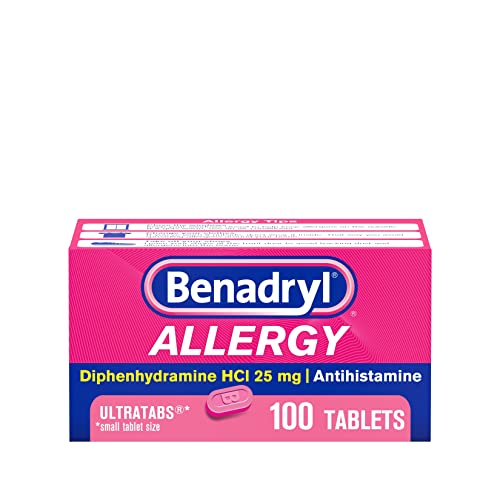Do you have a dog that is constantly scratching and biting himself? If so, you’re not alone. Many dogs suffer from itchy skin, which can lead to scratching and biting. In this blog post, we’ll discuss the causes of itchy skin in dogs and how to treat it. We’ll also provide tips for preventing your dog from scratching and biting himself.
What Can I Give My Dog for Itching and Biting
There are many potential causes of itchy skin in dogs, ranging from allergies to parasites to fungal infections.
If your dog is scratching or biting themselves excessively, it’s important to take them to the vet so they can determine the cause and prescribe an appropriate treatment.
In the meantime, there are several things you can do at home to help ease your dog’s itchiness and make them more comfortable.
Some of these include giving your dog omega 3 supplements, feeding them hypoallergenic food, using medicated shampoo or hot spot sprays, and bathing them regularly.
You can also try limiting their exposure to allergens, and you can try to correct neurotic scratching and biting with consistent reinforcement training.
Omega 3 Supplements for Dogs
Omega 3 Treat (Buy Online) can help soothe an itchy and irritated dog. Omega 3 fatty acids are beneficial for the skin and can help to reduce inflammation, irritation, and itching. They are also beneficial for a dog’s coat, helping to make it shiny and healthy.
Dog Allergy Supplements
Dog Allergy Relief Treats (Buy Online) are made with ingredients that help to soothe and protect your dog’s skin, provide relief from itching, and help to reduce inflammation. They are also gluten-free and made with natural ingredients, making them a healthy choice for your pup.
Hypoallergenic Dog Food
Hypoallergenic Dog Food (Buy Online) is designed to be gentle on the stomach and can help reduce food allergies. You can also get specially formulated whole food or raw dog food delivered right to your door, which is even better than mass-produced commercial dog food. Just be sure to start slowly with any new food to make sure your dog can adjust to its new diet.
Medicated Shampoo for Dogs
If your dog is itching and biting, it may be due to a skin infection or allergies. In this case, you may want to try using a Medicated Shampoo for Dogs (Buy Online). There are a number of medicated shampoos available, or your veterinarian can prescribe a specific shampoo if they determine that your dog has a more serious skin infection.
Dog Hot Spot Spray
What can I put on my dog’s hot spot to stop itching? There are a few things you can try to stop your dog’s hot spot from itching. First, you can try using a dog Hot Spot Spray (Buy Online). This will help to soothe the area and will also help to keep the area clean.
You can also try using a little bit of hydrocortisone cream on the area. This will help to reduce the inflammation and it will also stop the itchiness.
Finally, you can try giving your dog an oral antihistamine. This will help to reduce the histamine levels in the body, which will in turn help to reduce the itchiness and inflammation associated with hot spots.
Dog Wipes
Dog Wipes (Buy Online) are a great way to help your dog with itching and biting. They are pre-moistened and easy to use, and they can remove allergens and soothe irritated skin. You can find dog wipes at most pet stores and online.
Antihistamines
Antihistamines like Benadryl (Buy Online) can help relieve your dog’s itching and biting. However, it is important to talk to your veterinarian before giving your dog any medication. Your vet will be able to determine the best course of treatment for your dog based on their individual needs.
Bathe Your Dog
Bathing your dog regularly will help to alleviate itching and biting. Use a good dog shampoo and make sure to rinse off all of the soap. You may also want to consider using an anti-itch shampoo or conditioner made for dogs.
Limit Exposure to Allergens
One of the best things you can do for a dog with allergies is to limit its exposure to potential allergens.
This means keeping them away from places where they’re likely to encounter pollen, mold, dust, and other irritants. If your dog spends a lot of time outdoors, try to keep them inside during peak allergy season.
And if they must go outside, wipe their paws and coat off as soon as they come back inside. You can also use an air purifier in your home to help remove allergens from the air.
Anti-Parasite Treatments
There are a few different anti-parasite treatments that can help relieve your dog from itching and biting. Some of these treatments include oral medications, topical sprays and shampoos, and even disinfectants.
Flea Treatments
There are a variety of different Flea Treatments (Buy Online) that you can give to your dog to relieve itching and biting. Many over-the-counter medications work well but always check with your veterinarian first to make sure you are using the correct product for your dog’s size, age, and health condition. Some popular flea treatment options include oral medication, spot-on medication, shampoo, and collars.
Be sure to follow the directions on the package carefully and reapply as needed according to the instructions. You may also want to consider taking steps to prevent fleas from entering your home in the first place by regularly vacuuming and treating your pet’s bedding.
Antibiotics
If the itching and biting are due to an infection, your veterinarian may prescribe antibiotics. In some cases, a dog may have an infected wound or overgrowth of bacteria and you will need to give your dog an oral or topical antibiotic prescribed by your veterinarian.
Anti-Fungal Treatments for Dogs
If your dog is itching and biting, he may have a fungal infection. There are a few different anti-fungal treatments available for dogs, including oral medications and topical treatments.
If you suspect that your dog has a fungal infection, take him to the veterinarian for an accurate diagnosis and treatment plan. Left untreated, a fungal infection can cause serious health problems in dogs.
Training your Dog Not To Scratch or Bite Themselves
There are a few things you can do to train your dog not to scratch or bite themselves. One is to provide them with plenty of Brain Training Opportunities (Learn More). This can be done through puzzle toys, interactive games, and even simple obedience training exercises. By keeping their minds active, they’ll be less likely to focus on scratching and biting themselves.
Another approach is to use positive reinforcement when they don’t scratch or bite themselves. This could involve treats, praise, or other forms of positive attention. If you catch them in the act, quickly redirect their attention to something else (like a toy or a treat) so they associate good things with not scratching or biting.
Finally, make sure they have plenty of outlets for physical activity and mental stimulation
What To Feed Dogs with Itchy Skin
There are a few things you can do to help dogs with itchy skin. The main one is to feed them a grain-free diet. Dogs aren’t designed to digest grains, so they can often cause inflammation in the gut which leads to skin problems.
You might also want to try feeding them a limited ingredient diet, as this can help you figure out what specific ingredients are causing the problem.
And finally, make sure your dog is getting plenty of essential fatty acids, as these help keep the skin healthy and itch-free.
What Causes Dogs To Scratch and Bite Themselves?
Dogs can scratch and bite themselves for various reasons, including allergies, dry skin, anxiety, fleas, lice, scabies, and even certain diseases that can cause dry flaky skin and discomfort.
Why Do Dogs Scratch and Bite Themselves
Allergies
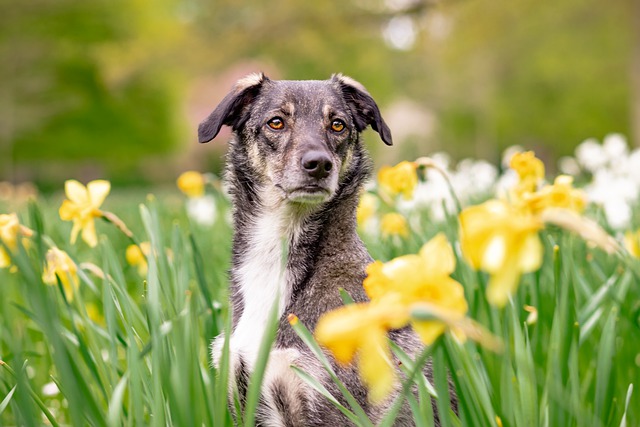
The most common reason why dogs scratch and bite themselves is allergies. Allergies can be caused by a variety of things, including pollen, dust mites, and flea bites. Dogs can also be allergic to certain foods or medications. If your dog is scratching and biting more than usual, it’s important to take them to the vet to narrow down the cause of the allergic reaction.
Dry skin

One common reason why dogs scratch and bite themselves is that they have dry skin. Without enough Omega 3 in their diet, dogs can develop dry, itchy skin that’s extremely uncomfortable. Adding a little bit of olive oil or fish oil to your dog’s food can help alleviate this problem.
Boredom
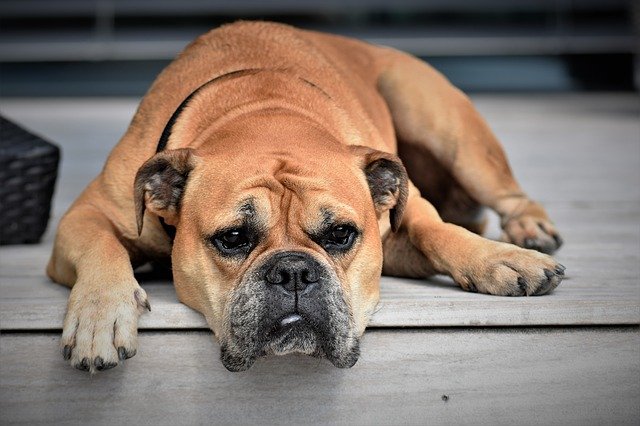
Dogs may scratch and bite themselves when they’re bored because it’s a way of releasing pent-up energy. Dogs that are inactive or that don’t have many toys to play with may resort to scratching and biting themselves as a way of entertaining themselves.
Giving your dog plenty of exercise and providing them with plenty of toys to play with should help reduce the amount of self-scratching and biting. If your dog is still scratching or biting excessively, you may want to consult with your veterinarian to rule out any medical causes.
Anxiety

Dogs may start to compulsively lick, scratch, or chew on themselves when they’re feeling anxious or stressed. This behavior is often called “self-soothing” and it can help a dog calm down. While it’s not harmful in and of itself, it can become a problem if the dog starts to injure himself. If you think your dog may be scratching or biting due to anxiety, talk to your veterinarian about ways to help him feel more relaxed and comfortable.
Pain
Dogs may also scratch or bite themselves if they’ve injured themselves, to help relieve their discomfort, dogs will scratch or chew at the area that’s causing them pain. This can sometimes lead to further injury, as well as infection, so it’s important to take your dog to the vet if it’s scratching or biting excessively.
Hormonal imbalances
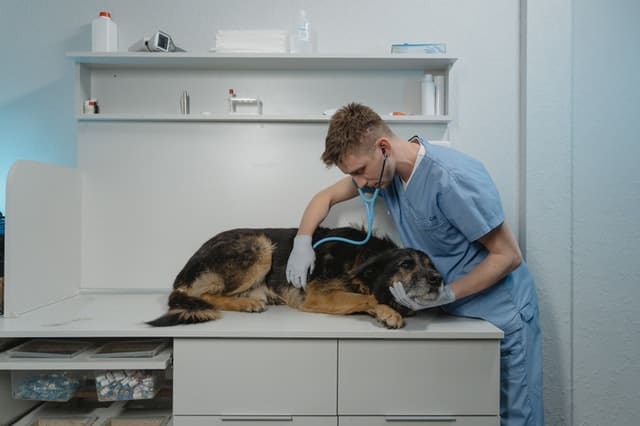
There can be a variety of reasons why dogs scratch and bite themselves, but one reason could be that they have a hormonal imbalance. For example, if a dog has a thyroid condition, it can lead to excessive scratching and biting. Other causes of hormonal imbalances that can lead to scratching and biting include:
- Cushing’s disease
- Diabetes mellitus
- Pancreatitis
- Hypothyroidism
Parasites
Dogs may scratch and bite themselves for many reasons, but one common cause is the presence of intestinal parasites. These parasites can be extremely irritating to dogs and may cause them to lick or bite at their rear end in an attempt to relieve the itching. If you think your dog may have parasites, it’s important to take them to the vet for diagnosis and treatment.
Fleas
There are many reasons why dogs scratch and bite themselves, but the most common one is fleas. Fleas are tiny parasites that attach themselves to a dog’s skin and feed on their blood. Not only are they itchy and annoying, but they can also cause skin irritation, redness, and even hair loss.
To get rid of fleas, it’s important to use a flea treatment that is specifically designed for dogs. You can either buy it from your vet or over the counter. Just be sure to read the instructions carefully so that you apply it properly and avoid any potential health risks.
Lice
Dogs will scratch and bite themselves if they have lice. Lice are parasites that live in a dog’s coat and cause intense itching. They can be treated with a topical medication, but it’s important to make sure that all of the lice are killed, or they will just come back. You can also use flea and tick repellent to help prevent lice from coming back.
Scabies
One potential cause of dogs scratching and biting themselves is scabies, a skin mite that can cause intense itching. The mites are tiny and transmit through close contact with an infected animal or person. They burrow into the skin and lay eggs, causing an allergic reaction that leads to scratching and biting.
Scabies is treated with a prescription topical cream, or in severe cases, oral medication. It’s important to treat all pets in the household, as well as any people who have been in close contact with the dog, to prevent the further spread of the mites.
Yeast infection
Dogs can scratch and bite themselves for a variety of reasons, but one commonly overlooked cause is an overgrowth of yeast. This yeast is normally found on the skin and in the gut but can overgrow in certain circumstances (such as when the dog has a weakened immune system).
If you believe your dog may have a yeast infection, you can get a prescription from your veterinarian for an antifungal shampoo or ointment to clear it up. Make sure to follow your vet’s instructions carefully and continue treatment until the infection is gone, to prevent it from coming back.
Bacterial infections
Bacterial infections can cause a lot of itchiness and discomfort for dogs. The most common type of bacteria that infects dogs is Staphylococcus. This bacteria is usually found on the skin and in the hair follicles of dogs. It can cause several skin problems, including hot spots, rashes, and abscesses.
Genetic Disorders
One possible reason a dog may be scratching or biting itself is because of an underlying genetic disorder. Several genetic disorders can cause a dog to scratch or bite itself. If you suspect that your dog may be suffering from a genetic disorder, it is important to take them to the veterinarian for diagnosis and treatment.
Infected Anal Glands
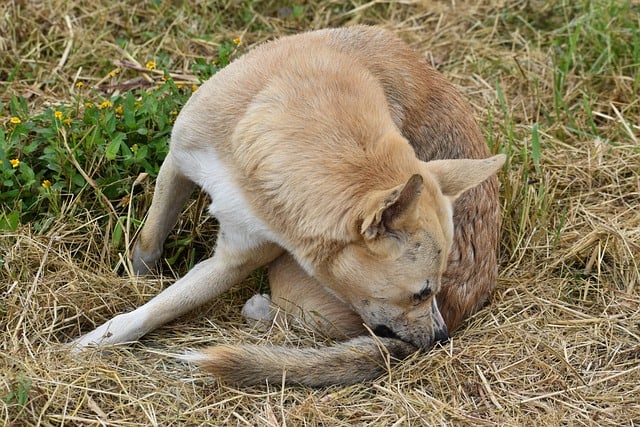
The anal glands are small, scent-producing organs located on either side of the rectum. Glands become infected if the ducts leading to them become blocked. Infection may cause the dog to lick and scratch the area around the anus, and in some cases, he may even bite himself. Treatment usually involves expressing or removing the glands. antibiotics may also be prescribed if an infection is present.
Dry, cold weather

Dogs may start to scratch and bite themselves more in dry, cold weather. This is because the lower humidity levels can cause their skin to become dry and irritated. Increasing the humidity in your home with a humidifier may help to reduce your dog’s scratching and biting.
Excessive Bathing
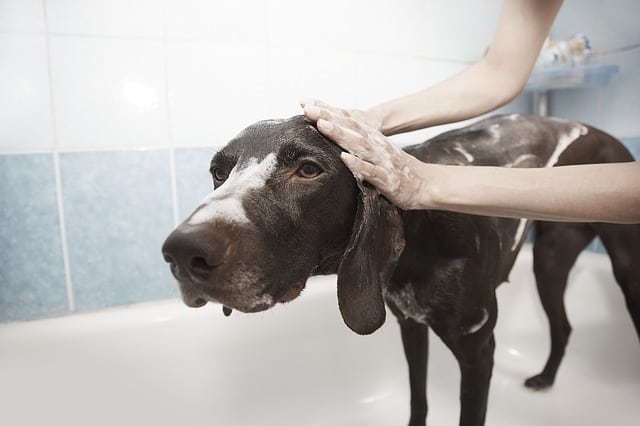
Bathing too often can strip a dog’s skin of its natural oils, causing it to become dry and itchy. This can lead to excessive scratching and biting.
Itching, Scratching, Chewing Symptoms of in Dogs
- Excessive Scratching
- Skin & Fur Licking
- Gnawing & Biting
- Rubbing
- Self-Harm
- Skin Redness
- Bald Spots
- Whimpering
- Anxiety
- Aggression
Why Is My Dog Constantly Scratching And Biting Himself FAQ
How much scratching is normal for a dog?
While some occasional scratching is normal for dogs, constant scratching can be a sign of an underlying medical condition. If your dog is incessantly scratching, it’s important to take them to the vet to rule out any possible health issues. Additionally, you’ll want to make sure that your dog is regularly groomed to help prevent excessive scratching.
How to get my dog to stop chewing themselves?
There are a few things you can do to help your dog stop chewing themselves. The first is to give them chew toys to gnaw on instead of their own body. You can also buy Dog Safe Chew Deterrent Spray (Buy Online), which tastes bad to dogs and will make them stop chewing on themselves.
If your dog is still biting themselves despite all of this, you may need to put a neck cone on them so they can’t reach the area that’s being bitten.
Finally, always be sure to train your dog properly so that they know not to chew on things they’re not supposed to.
How to get my dog to stop chewing their paws?
To keep your dog from chewing their paws, you can try using a Bitter Paw Safe Chew Deterrent spray. This type of spray is designed to taste bad to dogs so that they’ll stop chewing on their paws.
Can I use an anti-itch cream on my dog?
In most cases, it’s best to use an anti-itch cream specifically formulated for dogs, as human anti-itch creams can be harmful if ingested by dogs.
How do you clean a dog with skin allergies?
There are a few different ways to clean a dog with skin allergies. You can use hypoallergenic dog shampoo, waterless dog shampoo, or dog wipes.
Hypoallergenic dog shampoo is specifically designed for dogs with sensitive skin, and it’s available at most pet stores.
Waterless dog shampoo can be used when your dog isn’t able to take a bath, and it’s available at most pet stores as well.
Dog wipes are great for quick cleanups, and they’re available at most pet stores or online.
Why is my dog’s itching worse at night?
There can be a few reasons why your dog’s itching might be worse at night. One possibility is that the dog is feeling anxious or stressed and that this is causing them to itch more.
Another possibility is that hormonal changes are happening at night that are making the dog restless and itchy.
Finally, it’s also possible that environmental factors or allergens are affecting the dog at night which are causing them to itch more than during the day.
Whatever the reason, if your dog is consistently itching more at night, it’s a good idea to take them to the vet so that they can get checked out and hopefully treated.








